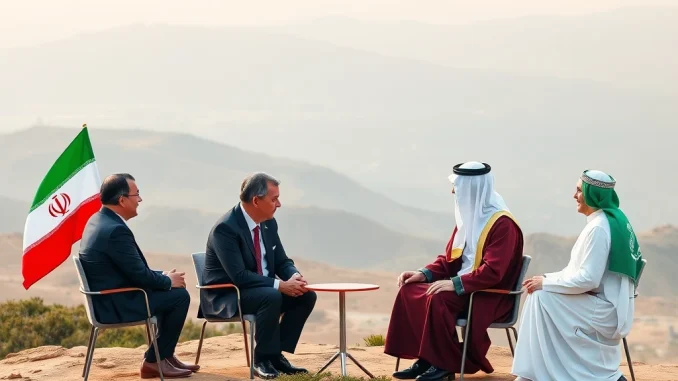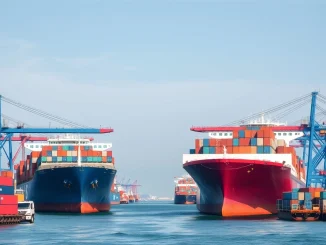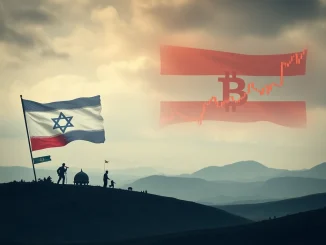
In the fast-paced world of global finance, even seemingly distant geopolitical events can send ripples through markets, including the cryptocurrency space. A recent development concerning an **Iran ceasefire** request highlights how complex international relations can become. This isn’t just about distant conflicts; it’s about the intricate web of power, negotiation, and stability that underpins the global economic environment where digital assets operate.
Iran’s Diplomatic Gambit: Seeking a Ceasefire
According to reports citing Reuters, Iran has reportedly reached out to key regional players – Qatar, Saudi Arabia, and Oman. The objective? To enlist their support in urging former U.S. President Donald Trump to exert pressure on Israel for an immediate ceasefire. This move signals Iran’s intent to navigate the current regional tensions through diplomatic channels, leveraging the relationships these Gulf nations have with the United States.
Why involve these specific countries? Qatar, Saudi Arabia, and Oman each maintain unique relationships with both the U.S. and Iran, positioning them as potential intermediaries in complex situations. Their involvement underscores the multifaceted nature of **Middle East diplomacy** and the search for influential voices in international negotiations.
What’s On Offer? Flexibility in Nuclear Talks
The request for assistance comes with a significant potential incentive. Sources suggest that in return for their efforts in facilitating a ceasefire, Iran is offering flexibility in its **nuclear talks** with the U.S. This link between regional conflict resolution and the long-stalled nuclear negotiations adds another layer of complexity to the situation. Flexibility in nuclear discussions could potentially pave the way for renewed dialogue or even a revised agreement, a development with broad implications beyond the immediate region.
Let’s break down the core elements of this reported proposal:
- The Request: Iran asks Qatar, Saudi Arabia, and Oman to press Donald Trump.
- The Target: Trump should urge Israel for an immediate ceasefire.
- The Incentive: Iran offers flexibility in nuclear negotiations with the U.S.
This proposed exchange highlights the interconnectedness of various diplomatic and security issues in the region and between **US Iran** relations.
How Could Geopolitical Shifts Impact Markets, Including Crypto?
While this news might seem far removed from Bitcoin or Ethereum, **geopolitical shifts** often have tangible effects on global financial markets. Increased stability or de-escalation in a volatile region like the Middle East can positively influence market sentiment. Conversely, rising tensions or prolonged conflicts typically introduce uncertainty, leading investors to seek safer assets or reducing overall market confidence.
For the crypto market, which is still relatively sensitive to macro-economic and geopolitical winds, news of potential de-escalation or progress in significant diplomatic areas could be viewed positively. It suggests a reduction in global risk factors, which can be beneficial for risk assets like cryptocurrencies. Conversely, if these diplomatic efforts fail and tensions escalate, it could contribute to market volatility.
Consider these potential impacts:
- Market Sentiment: Positive diplomatic progress can boost investor confidence globally.
- Risk Appetite: Reduced geopolitical risk might increase appetite for riskier assets like crypto.
- Oil Prices: Stability in the Middle East can influence oil prices, which in turn affects global inflation and economic policy – factors that influence crypto.
- Regulatory Environment: Shifts in international relations, particularly involving major global powers, can sometimes indirectly influence discussions around financial regulations, including those impacting digital assets.
It’s a chain reaction: Diplomacy affects stability, stability affects markets, and markets affect crypto.
Challenges and The Road Ahead for Nuclear Talks and Ceasefire
Achieving a breakthrough on both the **Iran ceasefire** and **nuclear talks** fronts faces significant hurdles. The complexities of the Israeli-Palestinian conflict, the long history of mistrust between the U.S. and Iran, and the diverse interests of regional players make any progress challenging. The involvement of former President Trump adds another unique variable to the equation, given his past policies regarding both the Iran nuclear deal and Middle East peace efforts.
Success hinges on multiple factors:
- The willingness of all parties to compromise.
- The effectiveness of the mediating nations (Qatar, Saudi Arabia, Oman).
- The political dynamics within the U.S., Iran, and Israel.
This situation is a prime example of how international relations are a delicate balance, with many moving parts.
Concluding Thoughts: Watching Geopolitics Closely
The report of Iran’s request to Middle Eastern nations to press for an **Iran ceasefire** in exchange for flexibility in **US Iran** **nuclear talks** is a notable development in **Middle East diplomacy**. While the direct impact on cryptocurrency markets isn’t immediate or guaranteed, it serves as a reminder that global events are interconnected. Keeping an eye on significant **geopolitical shifts** provides valuable context for understanding the broader economic landscape that influences all financial markets, including digital assets. As this diplomatic story unfolds, its potential to affect regional stability and international relations makes it a situation worth monitoring for anyone tracking global events and their potential market implications.



